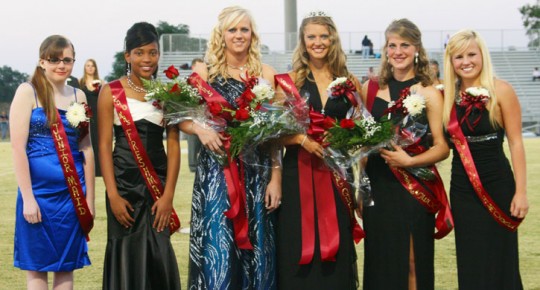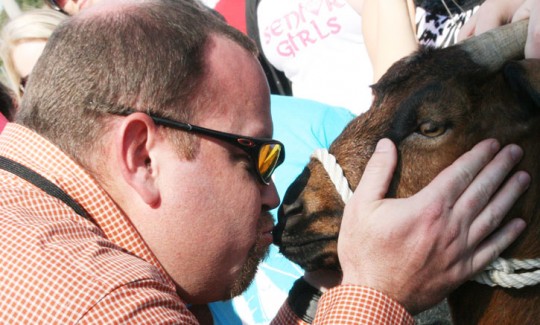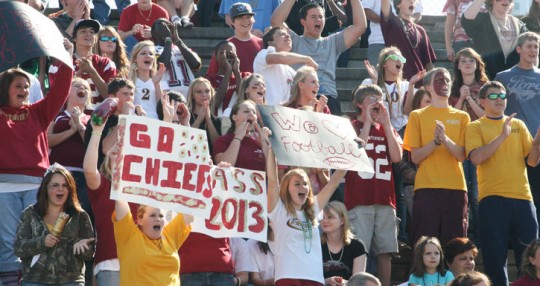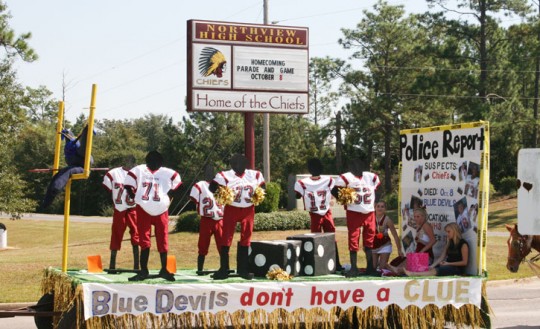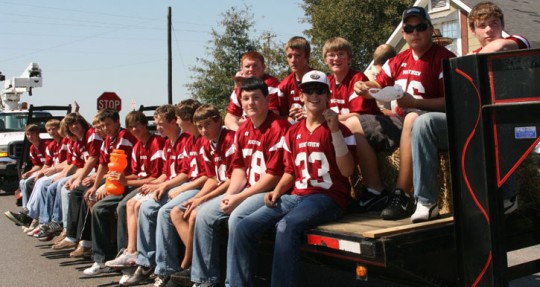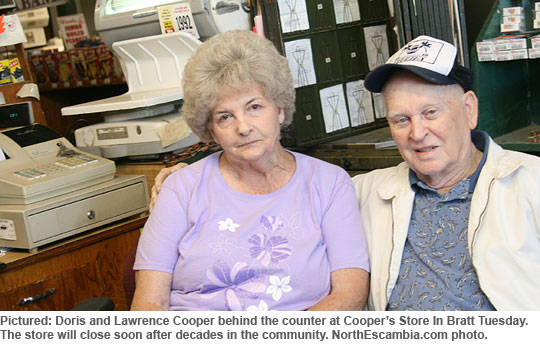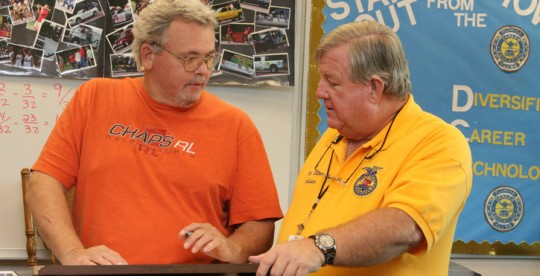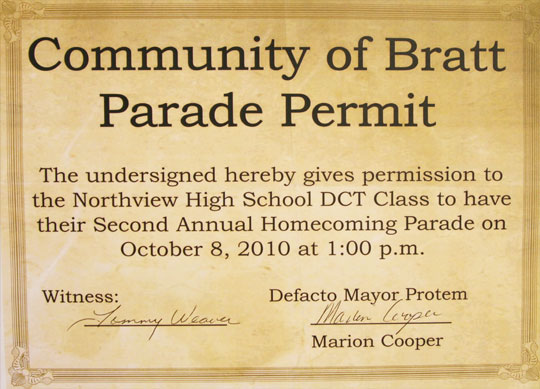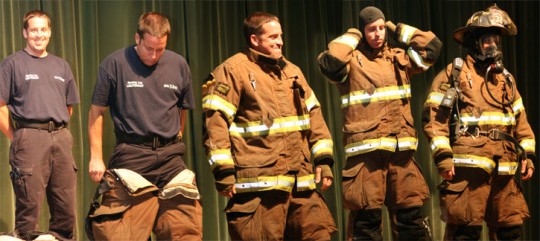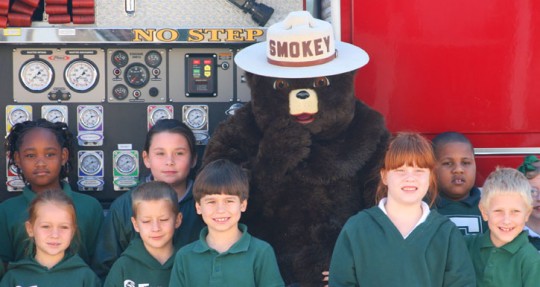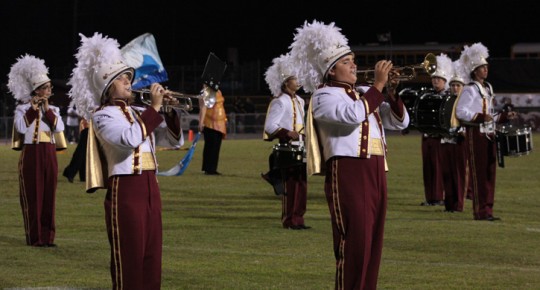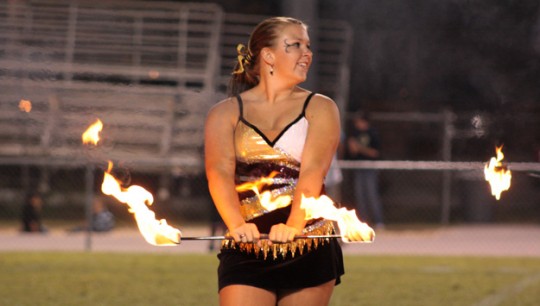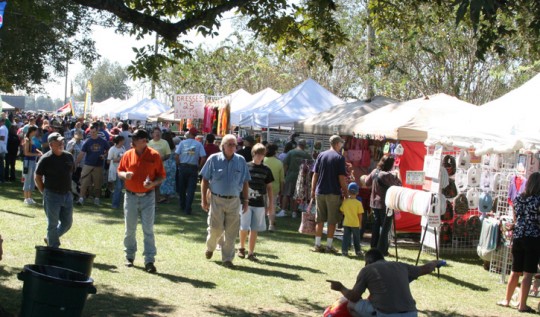Brooke Tullis Named Northview Homecoming Queen (Photo Gallery)
October 9, 2010
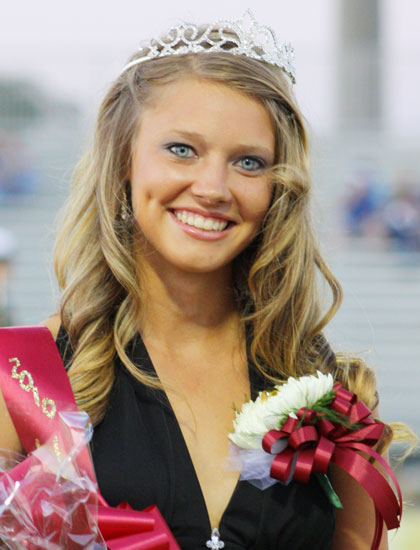 Brooke Tullis was named Northview High School’s homecoming queen Friday night.
Brooke Tullis was named Northview High School’s homecoming queen Friday night.
First runner-up was Kara Hardin, while Sarah Killam was named second runner-up. Freshman maid was Tamara Green, and sophomore maid was Ashley Cunningham. Chelsea Parham was named junior maid.
For a NorthEscambia.com photo gallery, click here.
Biographies for each member of the homecoming court appear below.
Pictured above: Junior Main Chelsea Parham, Freshman Maid Tamara Green, First Runner-up Kara Hardin, Homecoming Queen Brooke Tullis, Second Runner-up Sarah Killam and Sophomore Main Ashley Cunningham. Pictured inset: NHS Homecoming Queen Brooke Tullis. NorthEscambia.com photos, click to enlarge.
Anna Elizabeth Fischer, Freshman
Anna is the daughter of Jerry and Ramona Fischer. She is being escorted tonight by her father, Jerry Fischer. At Northview, Anna is co-captain of the JV cheerleading team. She is actively involved in the Ray’s Chapel youth group and ballet at the Byrneville Community Center. Anna enjoys all of the athletic opportunities at Northview.
Hilery Danielle Scott, Freshman
Danielle is the daughter of Christopher and Cathy Scott. She is being escorted tonight by her brother, Josh Scott. At Northview, Danielle is a member of the Spanish Club, Science Club, FCA and Musical theater. In her community, Danielle is an active member of the New Life Fellowship’s youth group. She also sings locally for for community events. Danielle enjoys the numerous club organizations at Northview.
Tamara Maria Green, Freshman
Tamara is the daughter of James and Vernell Green. She is being escorted tonight by her father, James Green. At Northview, Tamara is a JV cheerleader. She is also a member of the Spanish Club, Minority Culture Club, SGA and Science Club. In her community, Tamara is a praise dancer at Empowerment Tabernacle. Tamara enjoys all of the club organizations at Northview.
Ashley Renea’ Cunningham, Sophomore
Ashley is the daughter of Andy and Christina Cunningham. She is being escorted tonight by her grandfather, Jacky Cunningham. At Northview, Ashley is a varsity cheerleader. She is also a member of the SGA, FFA, Science Club, Track team and the cheer competition team. In her community, Ashley enjoys being a member of the local 4-H Club. Ashley enjoys the school spirit at Northview.
Tiffany Diane Sutton, Sophomore
Tiffany is the daughter of Donald Sutton and Paula Brown. She is being escorted tonight by her brother, Jesse Adcock. At Northview, Tiffany is a member of the Art Club, Interact Club and Track team. She is also an active member of the Walnut Hill Baptist Church youth group. Tiffany enjoys the comraderie and support that Northview provides.
Ashley Nicole Mooney, Sophomore
Ashley is the daughter of Scott and Sandy Mooney. She is being escorted tonight by her father, Scott Mooney. At Northview, Ashley is a varsity cheerleader. She is also a member of the softball team and FFA. In her community, Ashley is an active member of Healing Waters Church and a Relay for Life participant. Ashley enjoys the positive environment that Northview provides.
Chelsea Grace Parham, Junior
Chelsea is the daughter of Jason and Janice Parham. She is being escorted tonight by her uncle, Sgt. 1st Class Shawn Evans. At Northview, Chelsea enjoys participating in band and theater. In her community, Chelsea is a volunteer who works with school-aged children. Chelsea enjoys the friendly atmosphere at Northview.
Elizabeth Ashley Wright, Junior
Elizabeth is the daughter of Joe and Tami Wright. She is being escorted tonight by her father, Joseph Wright. At Northview, Elizabeth is president of the FBLA. She is involved in the Beta Club, Art Club, SGA and Weightlifting team. In her community, Elizabeth is an active volunteer at Sacred Heart Hospital, VFW Post 7016 and Ernest Ward Middle school band. Elizabeth enjoys activities and opportunities offered at Northview.
Abigail Christiane Odom, Junior
Abigail is the daughter of Melissa Martin. She is being escorted tonight by her grandfather James Windham. At Northview, Abby is the JV cheerleading team captain. She is also actively involved in Northview’s drama department. In her community, Abby is an assistant cheerleading coach for the Northwest Escambia Mites. She is also an active member of Enon Baptist Church. Abby enjoys friends and teachers at Northview.
Sarah Malinda Killam, Senior
Sarah is the daughter of Gary and Melanie Killam. Sarah is being escorted tonight by her father, Gary Killam. At Northview, Sarah is the Senior Class President. She is also a member of FCA, SGA, Rho Kappa, Beta Club, Varsity softball, Varsity volleyball and the Weightlifting team. In her community, Sarah is an active member of Flomaton First Baptist Church where she sings and plays the piano. Sarah enjoys the many activities that Northview offers.
Hayley Renee Simpson, Senior
Hayley is the daughter of Toney and Renee Simpson. She is being escorted tonight by her father, Toney Simpson. At Northveiw, Hayley is a majorette for the Tribal Beat Band. She is also a member of FCA, Beta Club, Rho Kappa and the softball team. Hayley enjoys the many friends and memories she has made at Northview.
Kara Renae Hardin, Senior
Kara is the daughter of Kerry and Jan Hardin. She is being escorted tonight by her father, Kerry Hardin. At Northview, Kara is the Student Government president. She is a member of the Spanish Club, FCA, volleyball team and softball team. She also participates in the drug awareness program. In her community, Kara is an active member of East Hill Church of Christ. Kara loves the caring faculty and staff at Northview.
Laneicia Dynette Gomez, Senior
Laneicia is the daughter of Luis and Denise Gomez. She is being escorted tonight by her father, Luis Gomez. At Northview, Laneicia is a Varsity cheerleader and secretary of the FBLA. She is also a member of the Minority Culture Club, Beta Club and the girls basketball team. In her community, Laneicia is an active member of Pilgrim Lodge Baptist Church. Laneicia enjoys the clubs and activities offered at Northview.
Dimond Brooke Tullis, Senior
Brooke is the daughter of Bodie and Emily Tullis. She is being escorted tonight by her father, Bodie Tullis. At Northview, Brooke is a Varsity Cheerleader. She is a member of SGA, Interact Club, Yearbook staff and the Drug Awareness team. She is also Senior class treasurer. In her community, Brooke is an active member of Bratt First Baptist Church. Brooke enjoys the memories and friends she has made at Northview.
Photo Gallery: Chief Spirit (And Goat Kissing)
October 9, 2010
Northview High School’s second every homecoming parade ended with a huge pep rally Friday afternoon.
For a NorthEscambia.com photo gallery from the pep rally, click here.
Pictured above: Northview High School Dean Gary Mattes kisses a goat during a pep rally Friday afternoon at the school. Pictured below: The Class of 2013 cheers during the pep rally. NorthEscambia.com photos, click to enlarge.
Photo Gallery: Northview Homecoming Parade
October 9, 2010
Click here for a photo gallery from Friday afternoon’s Northview High School Homecoming Parade.
Pictured: The Northview High School Homecoming Parade rolls through Bratt Friday afternoon. NorthEscambia.com photo, click to enlarge.
Weekend Gardening: Strawberries
October 9, 2010
In many parts of the country, strawberries are a summer crop, but here in Florida they grow best during the cooler months of the year. Plant yours between October 15 and November 15 to enjoy tasty berries in the spring.
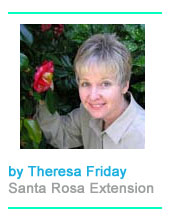 Temperatures between 50 and 80 degrees F and less than 14 hours of daylight are required for the development of flowers and fruit on most strawberry varieties. This combination of day length and temperature exists for much of the fall, winter and spring in Northwest Florida.
Temperatures between 50 and 80 degrees F and less than 14 hours of daylight are required for the development of flowers and fruit on most strawberry varieties. This combination of day length and temperature exists for much of the fall, winter and spring in Northwest Florida.
Strawberry plants are perennial; they can live for several years. However, because of their susceptibility to diseases, we normally grow them as annuals here in Florida. To be successful with strawberries, it’s important to plant the right variety, protect the flowers from freezing weather and manage pests.
The first step in successful strawberry production is choosing adapted varieties. Currently, the University of Florida suggests three varieties for the Florida home garden: ‘Camarosa’, ‘Sweet Charlie’, and ‘Festival’. All three varieties produce attractive, flavorful berries suitable for eating fresh or for freezing.
‘Camarosa’ has been the most productive variety in North Florida. It produces a blocky, dark red berry.
‘Festival’ is the number one variety in Florida. It has good red color and is a firm, conical shape berry with medium sweetness. It is an excellent choice for eating.
‘Sweet Charlie’ is a University of Florida variety. Although it is an older variety, consumers still like it. Its soft sweet fruit is an orange red color.
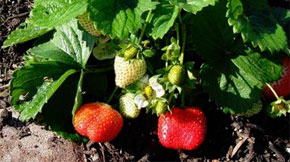 Strawberries grow best in a location receiving at least eight hours of direct sunlight per day. If a full sun location is not available, try to choose a spot that is sunny during the morning and early afternoon. The soil should be well drained and slightly acidic with a pH between 5.5 and 6.5.
Strawberries grow best in a location receiving at least eight hours of direct sunlight per day. If a full sun location is not available, try to choose a spot that is sunny during the morning and early afternoon. The soil should be well drained and slightly acidic with a pH between 5.5 and 6.5.
Strawberries can also be planted in growing boxes, strawberry pots, barrels and other containers. For best results, fill your container with a high-quality potting media—do not use garden soil.
Strawberry flowers and fruit can be injured by air temperatures below 32 degrees F. However, if properly planted, the plant itself will not be damaged unless the temperature falls to the low 20’s. If a frost or freeze is predicted, cover the plants with a lightweight blanket. This will help prevent the flowers or fruits from getting damaged.
The key to successful pest management is to begin with healthy, disease-free transplants. If problems do arise, be sure to contact your local Extension Agent for advice and recommendations. Additional advice is available in an online publication located at http://edis.ifas.ufl.edu/hs403.
The first berries should be ready to pick roughly 90 to 110 days after planting. The harvest season usually stretches through May with fruit yield peaking around March.
Pick berries when at least three-fourths of their surface has turned red. The fruit quickly deteriorate once it becomes totally red. So, it is best to harvest regularly—every two to four days.
Once picked, the berries will not sweeten any further. Freshly picked strawberries generally keep for only a few days, so be sure to eat them soon after harvest. If you have a surplus of berries, you may freeze them.
Theresa Friday is the Residential Horticulture Extension Agent for Santa Rosa County.
End Of An Era: Cooper’s Grocery To Close
October 7, 2010
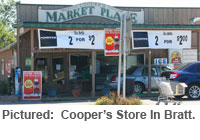 A long chapter in the lives of many North Escambia residents is closing soon — Cooper’s Grocery at the Bratt Crossroads will soon be no more.
A long chapter in the lives of many North Escambia residents is closing soon — Cooper’s Grocery at the Bratt Crossroads will soon be no more.
“I don’t know for sure when we will close it, but it won’t be long. Probably by the end of October,” Doris Cooper, 77, said Tuesday. She and her husband Lawrence Cooper, 84, have owned the country store at the heart of the Bratt community for 54 years.
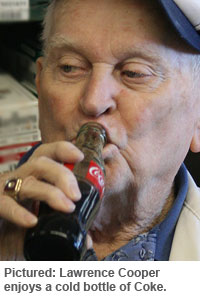 Besides church, Cooper’s is, without a doubt, the center of the Bratt community. Mornings are a hustle and bustle of activity at “Coop’s”, with moms and children buying those last minute snacks for the school day at Bratt Elementary. Northview High students grab sugary snacks and caffeine to fuel their day.
Besides church, Cooper’s is, without a doubt, the center of the Bratt community. Mornings are a hustle and bustle of activity at “Coop’s”, with moms and children buying those last minute snacks for the school day at Bratt Elementary. Northview High students grab sugary snacks and caffeine to fuel their day.
The wooden front door creaks and moans as it opens and rings the bell to signal another customer. Wooden shelves are stocked with most everything imaginable. Cokes are sold in various sizes of plastic bottles like any other store. But there’s the sound of pure American nostalgia each time the top is popped on a glass bottle of Coca-Cola using the bottle opener located at the front counter. Glass bottles of Coke have been sold at Cooper’s since it first opened at the end of World War II.
The Coopers have offered credit to members of the community for decades. Customers were, and are still, able to add their purchase to their “ticket” for later payment. No credit checks needed, basically just residency in the community.
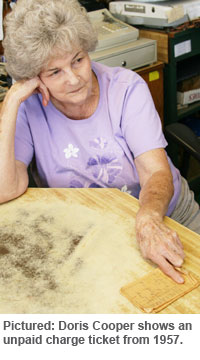 Some of the charge tickets are old and yellowed, waiting for decades payment. Tuesday morning, Mr. Lawrence located one from 1957. “3 doz. eggs $1.65. Gas $1.55. Groceries $21.35.” They know they will never be paid for the purchases 53 years ago. The gentleman that made the charges is long since deceased.
Some of the charge tickets are old and yellowed, waiting for decades payment. Tuesday morning, Mr. Lawrence located one from 1957. “3 doz. eggs $1.65. Gas $1.55. Groceries $21.35.” They know they will never be paid for the purchases 53 years ago. The gentleman that made the charges is long since deceased.
“But sometimes they will come back in here and make a payment,” Mr. Lawrence said. “I had a guy come in here and make a payment on an old one that I could not find right away. It wasn’t much, but he knew how much it was down to the penny that he owed.”
“I hope and pray that we’ve helped a lot of people,” Mrs. Doris said. “Sometimes that just what it is about.”
Anyone that has grown up around Bratt will happily tell you their memories about the candy counter. Well-stocked with all-time favorite candies, its the stuff dreams — and memories — are made of for little ones.
“Momma would give me 15 cents. We may have been poor, but I was spoiled with my 15 cents in here,” Donnie Bass, longtime Cooper’s Store customer said. “I would get a big candy bar, they were much bigger back then; a Coke and a honey bun.”
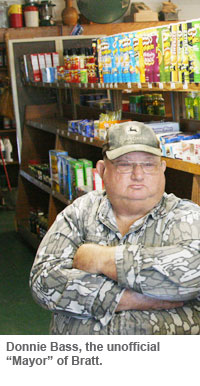 Bass, 64, has never really stopped going to Coopers. These days, it’s not uncommon to find Bass at the end of the counter, sharing his lighthearted outlook on most any subject that’s fit for discussion.
Bass, 64, has never really stopped going to Coopers. These days, it’s not uncommon to find Bass at the end of the counter, sharing his lighthearted outlook on most any subject that’s fit for discussion.
Known as the defacto mayor of Bratt, Bass and his buddies gather most mornings at the store to discuss the latest “news” of the day. They talk about the world’s problems, America’s problems and the local problems. And they always have a solution in mind.
“The world’s problems have been solved right here in this store,” Bass said, as he contemplated where he and his buddies will meet after the store’s closure. “I hate it when traditions are broken, don’t you? We might meet at my house, but I don’t know if that’s going to fly.”
It’s no secret that the solutions proposed by the men of Cooper’s Store have not solved America’s problems — the problems that have led to the demise of the store.
“It’s the economy really,” Mrs. Doris said as to why the store will close by the end of the month. And she said the couple hopes to do a little traveling. Then she started naming the trips taken through the years, all funded by the their little country store.
“We were blessed,” she said. “We able to do a lot with our children. We were probably one of the first families from Bratt to be able to go to Disney World.” Then there was the trip to California during which Mrs. Doris refused to get out of the car in Nevada because of legalized gambling.
“It was a Sunday and I wasn’t going to set foot on the ground in that state,” she said. As his wife continued to recount found memories of road trips with their children, Mr. Lawrence interrupted.
“We went to Wawbeek one day,” he said, bringing a chuckle from those around the counter. Even at 84, his humor is quick-witted.
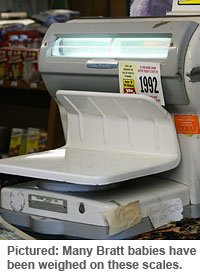 Cooper’s Store adapted over the years to changing times. They once stocked a full line of groceries including fresh meats, hardware, clothes, shoes and animal feed. The store sold gasoline until just recently, and they also added a pizza/deli counter. “We would sell so much back then,” he said, from suppliers like J.U. Blacksher, Flomaton Wholesale and Lewis Bear.
Cooper’s Store adapted over the years to changing times. They once stocked a full line of groceries including fresh meats, hardware, clothes, shoes and animal feed. The store sold gasoline until just recently, and they also added a pizza/deli counter. “We would sell so much back then,” he said, from suppliers like J.U. Blacksher, Flomaton Wholesale and Lewis Bear.
The meat and cheese scale is still at the front counter — mostly used to weigh babies, she said.
Mrs. Doris’ own children are no strangers to the store, with all having worked behind the counter at one time or another.
“It’s been our family for all these years,” she said. “I’m going to miss seeing all the people in the community. They are like our family.”
NorthEscambia.com photos, click to enlarge.
Bratt’s ‘Mayor Pro Tem’ Issues Homecoming Parade Permit
October 7, 2010
A “Community of Bratt Parade Permit” allowing the Northview High School DCT Class to hold a Homecoming Parade was signed Wednesday at Northview High School.
The “permit” was issued by “Defacto Mayor Protem” Marion Cooper of Cooper’s Grocery fame. The protem mayor was standing in for “Mayor” Donnie Bass who was unavailable Wednesday morning due to “important” Bratt business.
The Second Annual Northview Homecoming Parade will roll at 1:00 Friday afternoon from Bratt Elementary to Northview, where a pep rally will follow. There are currently about 40 floats, bands and other units scheduled to be in the parade.
To enter the parade for free, contact Tommy Weaver at (850) 327-6681 ext. 254.
Pictured above: Bratt’s “Defacto Mayor Protem” Marion Cooper (left) signs the Community of Bratt Parade Permit Wednesday at Northview High School as DCT Class sponsor Tommy Weaver witnesses. Pictured below: The parade permit. NorthEscambia.com photos, click to enlarge.
Flomaton Students Learn Fire Safety
October 6, 2010
Students at Flomaton Elementary School got a lesson in fire safety Tuesday morning. Flomaton Fire Lt. Jeremy Lee (pictured) demonstrated how a fireman might look when rescuing a child from a burning home. The children also learned about “Stop, Drop and Roll”, fire prevention and had the opportunity to meet Smokey the Bear.
For a NorthEscambia.com photo gallery from the event, click here.
NorthEscambia.com photos, click to enlarge.
Weekend In Photos
October 4, 2010
There was a lot going on in the North Escambia area this weekend, and NorthEscambia.com was there with hundreds of photos. Click any of the items below to see a photo gallery.
Photos: Northview Tribal Beat Band
October 4, 2010
Editor’s note: We took all of these photos of the the Tribal Beat Friday night, but due to a mistake on our part, they were not posted in a photo gallery we ran Saturday morning from the football game. We apologize for the error.
NorthEscambia.com photos, click to enlarge.
Photo Gallery: Thousands Attend Jay Peanut Festival
October 3, 2010
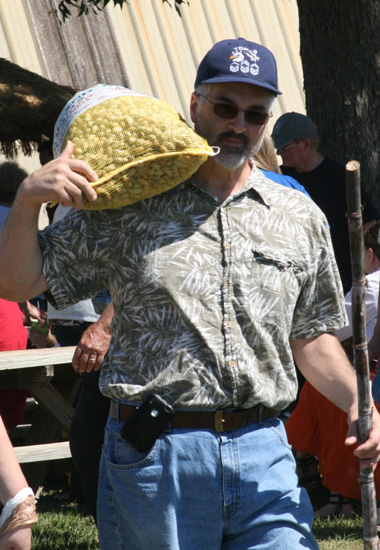 The 21st Annual Jay Peanut Festival attracted thousands to Jay this weekend.
The 21st Annual Jay Peanut Festival attracted thousands to Jay this weekend.
For a NorthEscambia.com photo gallery from Saturday at the Jay Peanut Festival, click here.
The Peanut Festival featured something fun for everyone including arts and crafts, antiques, inflatable rides, rock climbing wall, pony rides, hay rides, train rides and much more. The Gabbert’s 1930’s Farm Museum was also be open for tours. There was plenty of food too…kettle corn, BBQ, hamburgers, roasted corn, apple dumplings and more.
And, of course, peanuts were the star of the festival, and were will be plenty of green peanuts and boiled peanuts as well as fried, roasted and candied peanuts.
The event is dedicated to the memory of Melissa Caroline Gabbert, who died of cancer in 1990.
Pictured: Thousands attended the Jay Peanut Festival Saturday. NorthEscambia.com file photos, click to enlarge.


